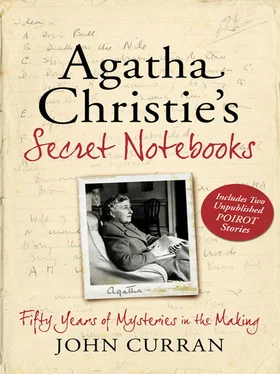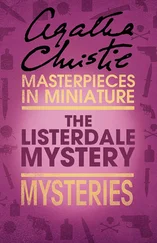There was a rustle beside Poirot and the smell of an exotic perfume.
Countess Vera Rossakoff plumped down beside him. She said:
‘Is it all real? Can it work?’
‘Why not?’
‘Can there be such a thing as brotherhood in men’s hearts?’
‘There can be the belief in it.’
She nodded thoughtfully. She said:
‘Yes, I see.’
Then, with a quick gesture she said:
‘But they won’t let him go on with it. They’ll kill him. Really kill him this time.’
Poirot said:
‘But his legend—the new legend—will live after him. Death is never an end.’
Vera Rossakoff said:
‘Poor Hans Lutzmann.’
‘His death was not useless either.’
Vera Rossakoff said:
‘You are not afraid of death, I see. I am! I do not want to talk about it. Let us be gay and sit in the sun and drink vodka.’
‘Very willingly, Madame. The more so since we have now got hope in our hearts.’
He added:
‘I have a present for you, if you will deign to accept it.’
‘A present for me? But how charming.’
‘Excuse me a moment.’
Hercule Poirot went into the hotel. He came back a few seconds later. He brought with him an enormous dog of singular ugliness.
The Countess clapped her hands.
‘What a monster! How adorable! I like everything large—immense! Never have I seen such a big dog! And he is for me?’
‘If it pleases you to accept him.’
‘I shall adore him.’ She snapped her fingers. The large hound laid a trusting muzzle in her hand. ‘See, he is as gentle as a lamb with me! He is like the big fierce dogs we had in Russia in my father’s house.’
Poirot stood back a little. His head went on one side. Artistically he was pleased. The savage dog, the flamboyant woman—yes, the tableau was perfect.
The Countess inquired:
‘What’s his name?’
Hercule Poirot replied, with the sigh of one whose labours are completed: ‘Call him Cerberus.’
Unlike the collected version, which is set unequivocally in London, the previously unpublished version has, like many other Labours, an international flavour. From the first sentence we are ‘abroad’ and, for the third time in the Labours, in Switzerland (perhaps significantly a neutral country). Poirot has already visited the country during ‘The Arcadian Deer’ and ‘The Erymanthian Boar’.
A most unlikely and almost unique thought for Poirot!
This is a reference to the first meeting of Vera Rossakoff and Poirot in ‘The Double Clue’, published in December 1923, when he unmasked her as a jewel thief. They subsequently met four years later in The Big Four .
This is a reference to The Big Four when Poirot arranges the return to the Countess of the small son she had thought long dead.
The passage about the Countess’s son is almost word-for-word the same as in the collected version of the story.
It seems odd that Poirot would look forward to drinking vodka.
Although he sounds like a character from the world of operetta, it is difficult not to think of Mussolini.
Despite the unavoidable allegory throughout the story, this is the only unequivocal reference to the Nazis.
The dog handler is called Mr Higgs, and described as ‘odorifer-ous’ in both versions of the story.
Such is the political flavour, the eponymous Hound is almost forgotten and he plays a much smaller role than his counterpart in the collected story.
In the course of this story we see a different Poirot, one who longs for the company of a woman, drinks vodka and now climbs over a wall, although this is a feat he has already performed in the course of the eleventh Labour, ‘The Apples of the Hesperides’. Indeed, the tracking down and eventual discover,’ of August Hertzlein is reminiscent of a similar procedure involving the Cellini chalice in that story.












